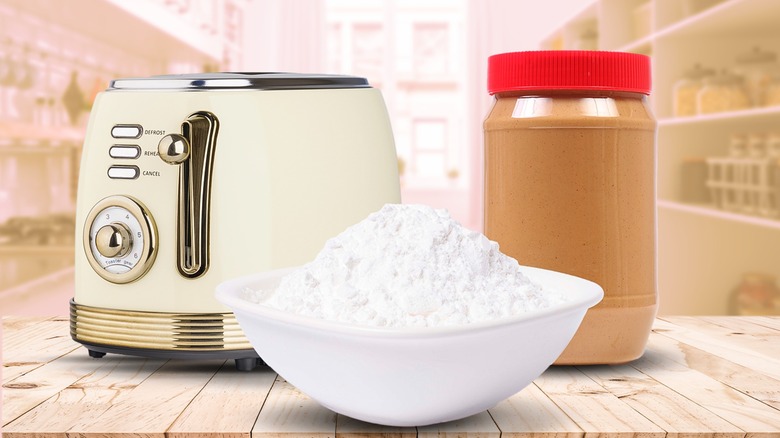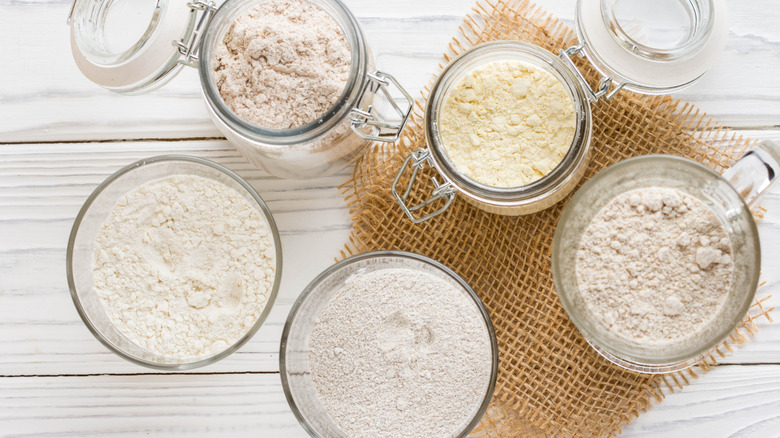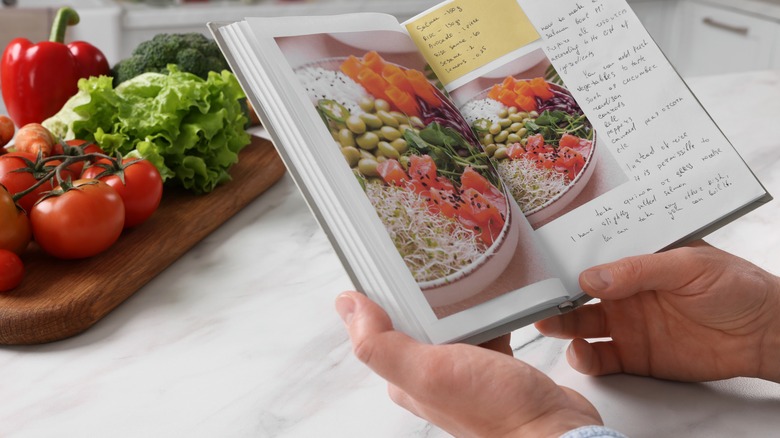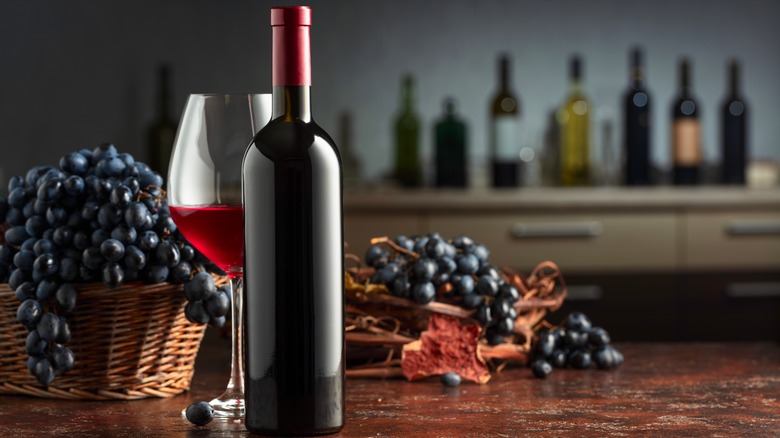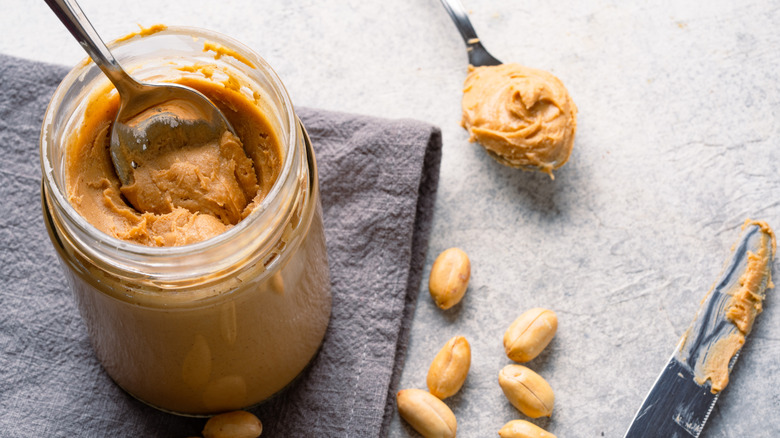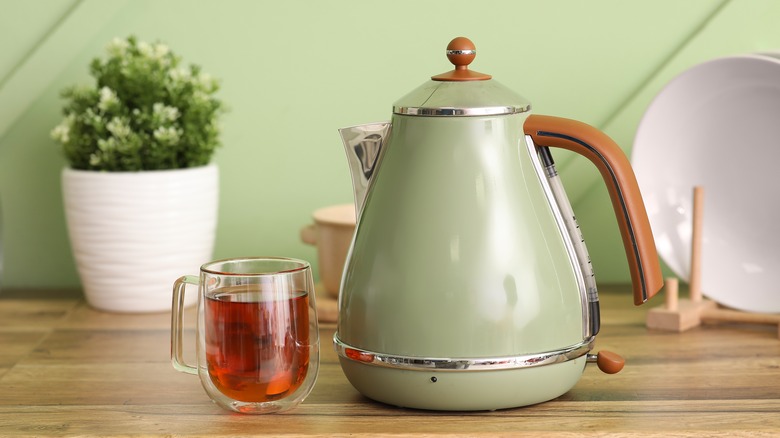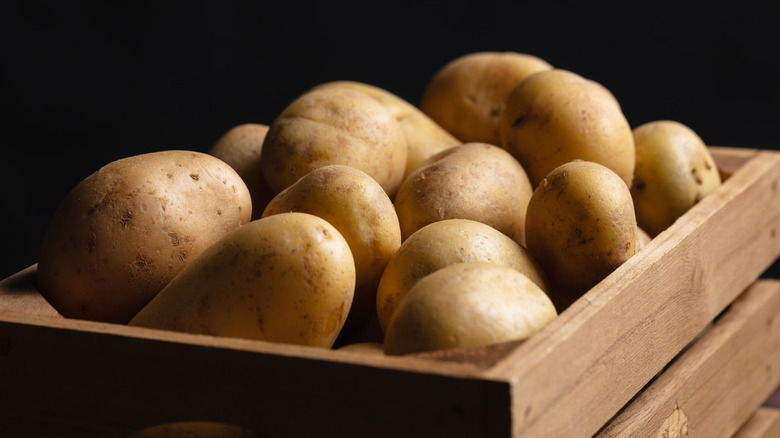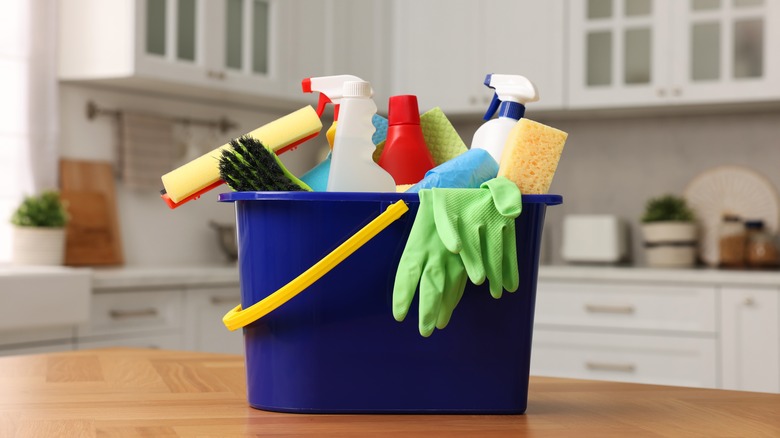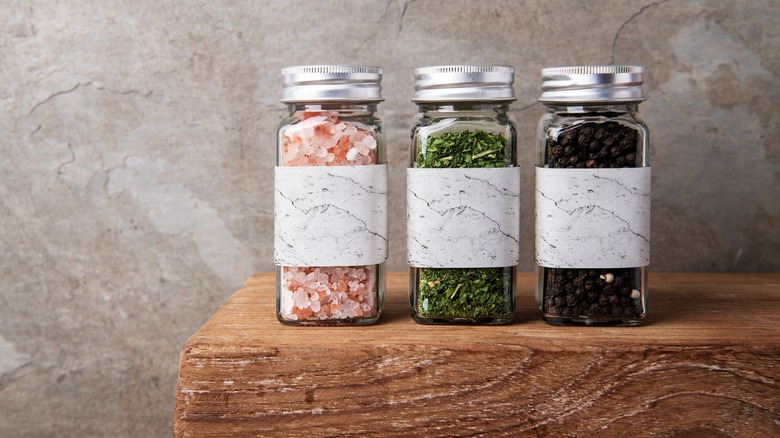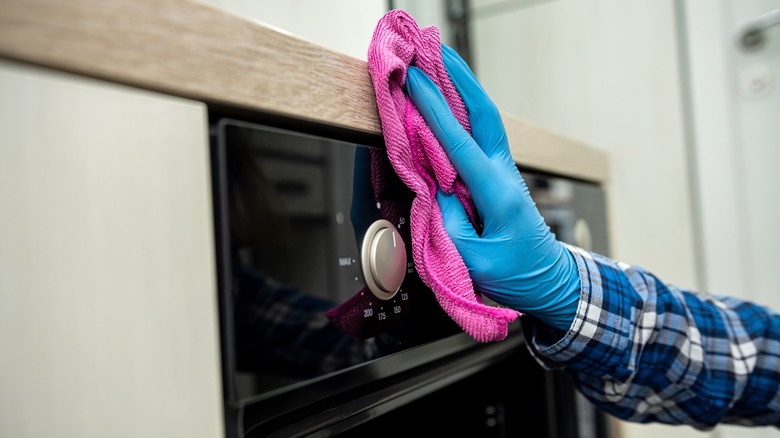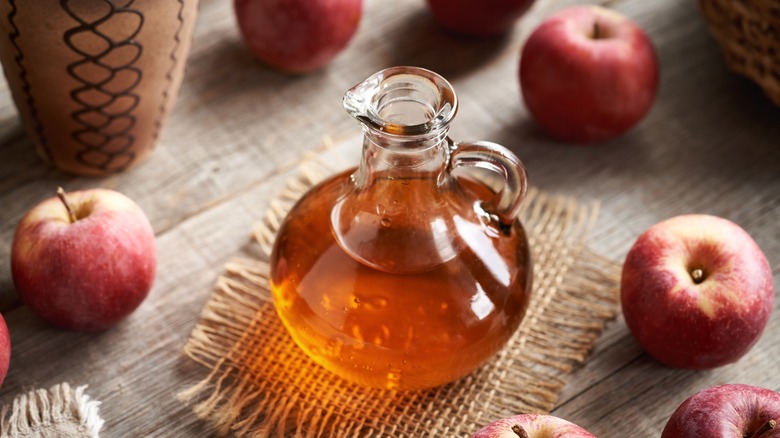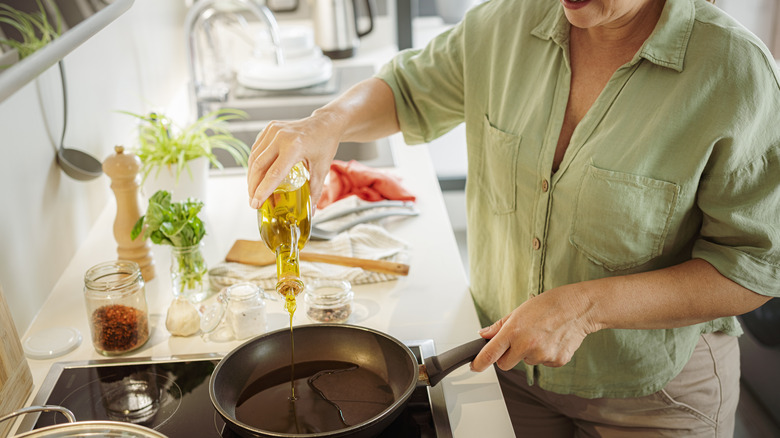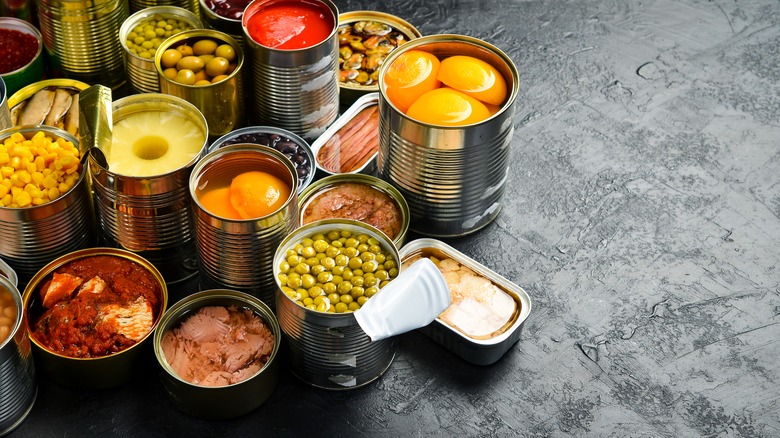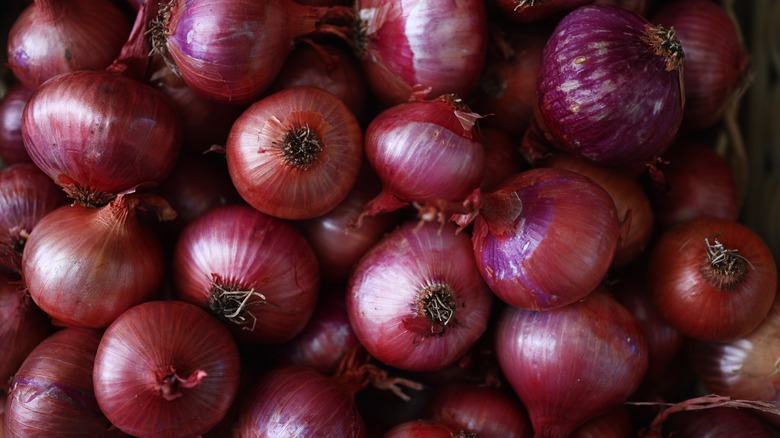15 Things You're Storing In The Kitchen All Wrong
We may receive a commission on purchases made from links.
We completely understand: Keeping your kitchen organized can be a challenge. There aren't enough hours in the day to get everything accomplished as it is, and it's easy to find things getting shuffled around, stored haphazardly, and suddenly, you've got an overwhelming mess on your hands. There are a ton of kitchen organization hacks that will help make mealtime a breeze, but there are some things you might be storing wrong — particularly if you're trying to make meal prep easier.
These kinds of storage mistakes are incredibly easy to make. You use cooking oil all the time, for example, so it makes sense to keep it close at hand. Doesn't it? What about those small appliances and electronics you use on a regular basis? It turns out that you might be making things a little more convenient, but you might also be sacrificing freshness, quality, or even safety.
With that in mind, let's talk about some of the most common mistakes. We'll explore just what's going on in your kitchen, the risks you might not realize you're taking, and some solutions that will help make your meals taste better, your groceries last longer, and your home just a little bit safer.
Flour
There are a variety of different flours that have a myriad of uses, and experts actually recommend storing them a little differently. First, let's start by saying that if you keep it in the paper bag it came in, that's not a great idea. Flours of all types can absorb all kinds of things from the environment, and this, at least, is easy to avoid: Just put the whole bag into an airtight container.
Surprisingly, where you should be keeping that container depends on the type of flour. You'll want to keep flour in a dark place, but also one where it's not going to get too warm, so don't use those cabinets near the stove. All types of flour can be kept in the freezer for maximum freshness, but if you have whole grain flour or any kind of nut flour, you'll definitely want to keep these in the freezer — or at least in the fridge — even if you're planning on using them quickly. As a general rule, the higher the oil content of flour, the faster it'll react to environmental conditions and the faster it'll go bad.
Cookbooks
We get it — it's super tempting to keep your cookbooks on a shelf in the kitchen, especially if you're working your way through Gordon Ramsay's entire library of books. But if you're allowing them to double as decorations and supply a little bit of in-your-face inspiration at the same time, you might be doing yourself — and your books — a major disservice. For starters, your kitchen tends to be a hot, humid environment, and if you're keeping books on a shelf near your stove, sink, or other workspaces, that's going to lead to your collection getting ruined, waterlogged, or even starting to mold. That can be heartbreaking, especially if it's a vintage collection of books and recipes.
That's not to say that you need to banish them from the kitchen. Consider glass-fronted cabinets that will offer them a little protection from the elements, or perhaps a shelf in your kitchen island that's well away from any splash zones. However, it might be better to move your collection to the dining room.
Wine
Anyone who's a fan of sipping on a glass of wine while cooking is probably guilty of this one: You get a bottle, then leave it on the counter, on the top of (or inside) the fridge, or put it in that little wine rack you have in the kitchen. Exactly what can happen (and how fast it happens) depends on the conditions and on the type of wine, but no matter what your favorite vino is, it can be turned funky by things like high and fluctuating temperatures.
There are sneakier factors at work here, too: The vibrations of your fridge, a regularly-running vent hood, or a dishwasher can help turn your wine funky. Also, leaving a corked bottle sitting on your counter increased the liklihood that the cork is going to dry out, and a few things can happen. That's going to speed up your wine going bad, and it can also lead to messy leaks.
Don't worry, we're not going to tell you that you need to invest in a wine fridge. Great places are dark, cool, and stay at the same temperature. A basement can be a good option, or move that wine rack into your bedroom or living room closet.
Peanut butter
If you get a craving for an upgraded peanut butter and jelly sandwich just once in a while, you might keep that jar open and on hand for a few months. Peanut butter might last a long time, but it turns out that where you should be keeping that jar depends on how long it's been open.
You'll hear it said a lot that cool, dark places are the best for many food items, and that's the case here. However, when you open that jar, you might want to write the date on the lid. That's because it'll be fine in a cabinet, cupboard, or pantry for a few months, but if you're keeping that jar around any longer than that, things can start to turn a little not-so-fresh. Once you start getting around the three-month mark, put it in the fridge. It might be a little bit harder to spread, but it'll taste much better than it would if you left it in a warmer cupboard. There is a caveat to this, though. If you're using natural, additive-free peanut butter, you'll want to keep those in the fridge from the moment you crack open that lid.
Small appliances
If you love your kitchen gadgets, you're definitely not alone. However, you might be keeping them in the wrong place and shortening the lifespan of your small appliances and even other kitchen features, all without even realizing it. If you're storing occasionally-used tools like immersion blenders and food processors in the kitchen, you should know that moisture can damage cords and, in some cases, even internal components.
Now, let's talk about the damage they could be doing. If you have your tea kettle on the counter under cabinets, for example, you could be releasing steam that's going to destroy those upper cabinets in the long run.
There are a few better options than, say, keeping that stand mixer tucked away under the sink, or the coffee maker slowly damaging your cabinets. Making storage space in the pantry is a great idea, and there's even a name for it: an appliance garage. You might consider reexamining storage solutions that are meant to make the most of those awkward corner cabinets or hidden storage options under bench seating. Slide-out shelves might also be easy to install and use for appliances you use every day, and they'll help prevent those steam-related issues.
Potatoes
There are a ton of creative ways to use up a big bag of potatoes, and proper storage means the last few will be as fresh as the first. If you're just tucking that bag away somewhere in your kitchen, though, you're doing your potatoes a major disservice.
First, decide which potatoes you're going to use right away and which you're going to keep. If there are any funky spots, they're unlikely to last, so use those first. Ventilation is key, so opt for keeping that mesh bag you bought them in, or invest in a set of hanging mesh produce bags.
Finally, the heat of a kitchen isn't the best place for them. Ideally, they should be in a dark place that's cooler than a standard room temperature, making a basement or cool pantry ideal. However, it's also worth noting that the kind of temperatures you'll find in a fridge are just as bad. Cold temperatures will kick-start changes in the chemical makeup of your spuds, ruining the taste. Additionally, cooking potatoes that have gone through these chemical changes can result in the creation of the potentially cancer-causing chemical called acrylamide.
Cleaning chemicals
We all know how important it is to keep your kitchen clean, but there are some cleaning mistakes that could turn toxic. Keeping cleaning chemicals in the kitchen might seem like a great way to make life easier, but heat and temperature fluctuations can cause all kinds of problems. Some chemicals might react with heat in a way that leads to bursting or leaking containers, aerosol containers have been known to explode when subjected to extreme heat, and some cleaners will degrade, break down, and simply become ineffective.
The best place to store cleaning chemicals depends on your kitchen's setup. Under the sink might be a viable option, but if that's near the stove and tends to get warm, you're going to want to find another place. Pick somewhere that stays cool, is out of direct sunlight, and has decent ventilation. Some chemicals can release fumes, and if you're storing them in a cupboard with no airflow, it could cause problems.
Finally, opt for keeping everything organized with the help of open storage bins, like these ClearSpace Plastic Storage Bins. They'll keep everything organized, catch any leaks or spills, and it's easy to tuck a bin away somewhere out of the reach of children and pets.
Herbs and spices
We totally get it. There's something incredibly satisfying about a beautifully displayed rack of herbs and spices, and it makes sense to keep them close at hand. However, if you've got your herbs and spices in a place where they're exposed to light, heat, or moisture, you're not doing them — or your cooking — any favors.
All those elements can shorten the lifespan of your spices, make them less potent, and might even lead to some absorbing unwanted flavors. Keeping them in a dry, dark place is key, and so is opting for airtight containers like these ProKeeper Seasoning and Spice Storage Containers. Keep your spices in a cabinet or drawer far away from your stove and oven, and here's another tip: When you're using them, use a measuring spoon to transfer your seasonings into a pot on the stove. That will prevent moisture from getting into your containers, which defeats the entire point of airtight containers in the first place! Finally, don't put them in the fridge or freezer, as that's going to cause moisture and condensation buildup as well.
Rags you've used for cleaning
Cleaning your kitchen as you go is always a great idea, and prevents things like cross-contamination and those incredibly depressing piles of dirty dishes. However, you should be mindful of how you're storing your cleaning rags, particularly if you're using them to wipe up oils and grease.
Cleaning rags have been connected to causing incidents of spontaneous combustion, and here's the thing: It can happen even after you've washed them. Your household washing machine and standard detergents can't cut through the kind of grease and oil you might be wiping up after making a delicious meal of chicken fried chicken with creamy gravy, so piling those oily rags — before and after washing — in a hot kitchen can cause major problems.
Fortunately, keeping things safe is straightforward, and let's take a page out of the playbook of commercial kitchens. Clean and dirty rags are stored separately and kept in metal containers. Soak grease-covered rags before washing, and although it's easy to forget about them in the dryer, don't — remove them, let them cool, and move them to your metal storage containers.
Vinegar
Vinegar has a reputation as being fairly indestructible and infinitely long-lasting, but exposure to heat, light, and air will make flavors start to degrade. Keeping those beautiful bottles on display by the stove might look nice, but it's also precisely what you shouldn't do.
So, let's talk about what you should do. Since vinegar can react with certain containers, glass bottles aren't just pretty, they're practical. In most cases, a bottle of vinegar will be fine in a cool, dark pantry for months, but there are some instances where you do need to refrigerate it. If you have a large bottle of a type of vinegar you don't use often, and you're expecting to have it around for several years, pop it in the fridge. Remember, it's the acidity that makes vinegar shelf-stable, so low-acidity vinegars like balsamic, malt, and rice wine vinegars can go in the fridge. Finally, unpasteurized vinegar or vinegar that still contains the mother should also go in the fridge.
Medication and vitamins
Many types of medications need to be taken with food or at the same time every day. That might make it seem like the kitchen is a great, convenient place to keep pills, but it's not that simple. Different medications need to be stored differently, so let's talk about some generalities. In many cases, it's recommended to keep bottles in a cool, dry place, so that drawer near the stove is a no-go. Dampness can also interfere with effectiveness, and if your kitchen tends toward the humid side, that could be a problem.
Even vitamins and supplements can be badly damaged by heat and humidity, so believe it or not, some pharmacists suggest keeping medication in the bedroom or pantry instead. No matter what kind of medication or supplement you're looking at, be sure to read directions. The cold temperatures of the fridge will damage some, but others — like fish oil and flaxseed — will last longer in the fridge. And if you prefer to use those clear pill organizers, remember that some medications can be vulnerable to direct light.
Cooking oil
Cooking oil is another item that you might want to keep handy, and sometimes, that can mean keeping bottles on the counter or in a cupboard near the stove. That's where you're going to be using it most of the time, but that's also exactly where you shouldn't be storing them. It's worth noting that different oils do better when stored in different ways, but that oh-so-common practice of keeping them next to the stove is bad across the board.
Some oils can be refrigerated — like coconut and sesame oil — while some shouldn't be, so let's talk about some general guidelines. In order to keep your oil fresh, you'll want to protect it from light and heat. They're exposed to both of those things when they're kept in a clear bottle by the stove, so you might want to move those bottles into the pantry or at least to a cabinet far from heat sources. It's also not a bad idea to invest in opaque bottles, like this Sweejar Olive Oil Dispenser Bottle.
Canned goods
Surely, storing canned goods is the easiest thing in the world to get right ... right? Sort of. If you're in a hot climate or if you regularly store canned foods in a cabinet or cupboard near the stove, there's a very good chance that even shelf-stable canned foods can spoil or degrade. The general rule of thumb is that canned goods shouldn't be kept anywhere that regularly hits temperatures higher than 75 degrees Fahrenheit, which, in many places, is common. If temperatures pass 100 degrees Fahrenheit, you're risking the growth of microbes and pathogens, and as anyone who's been in Arizona in the summer can attest, those temperatures happen.
You'll also need to consider that moisture and steam can cause rust and unsafe foods, and here's more food for thought. Just because food is canned, that doesn't mean you can keep it at room temperature. Some things — like some canned ham — need to be refrigerated. Of course, most cans will be fine in a dark, relatively temperature-controlled pantry.
Onions
Onions may be delicious, but they're also tricky to store. Let's fix that, though, and say that you should absolutely store your onions unwashed and unpeeled in a cool, dark place such as a closet, basement, or pantry. Maintaining air flow is absolutely key to preventing spoilage or rotting, so removing them from plastic bags and transferring them to mesh produce bags is ideal. Here's where it's easy to make a mistake.
Those are the same conditions that are ideal for potatoes, right down to the mesh bags. However, you should never store them together or even hang them next to each other. In fact, onions should be kept away from most other fruits, vegetables, and herbs. Because onions produce high amounts of ethylene, they can hasten the ripening, spoiling, and rotting processes of foods that are sensitive to the gas — particularly potatoes — and storing your onions wrong is a great way to shorten the life of your produce.
Pet food
If you have a cat or dog, there's a good chance you might keep their pet food in the kitchen. However, pet food — even dry kibble — contains oils that can turn rancid. A good rule of thumb is that pet food shouldn't be kept above 80 degrees Fahrenheit, and if that describes your kitchen, use pantry storage instead.
You might also be using a plastic and airtight container for your pet's food, and while that's a great idea, there's a major caveat to this: You shouldn't be emptying pet food bags into the container. Why? The next time you feed your pup, look at the inside of the bag. That shiny, textured bag liner was designed on purpose to help keep food fresher, longer, and plastic containers don't have the same protective surface. Keeping the food in the bag also means that you have all the information about expiration dates, brands, batch numbers, and other important identifying numbers. The Food and Drug Administration also oversees pet food, and when a recall is issued or reported, having those numbers is key to making sure you know your pet is safe.
